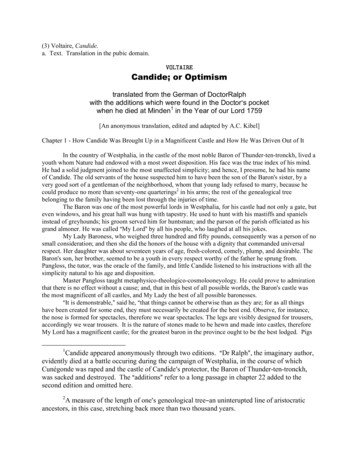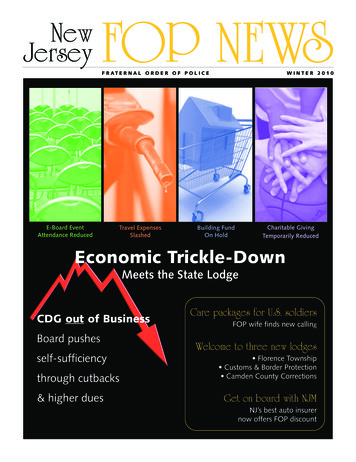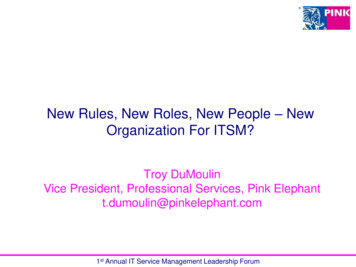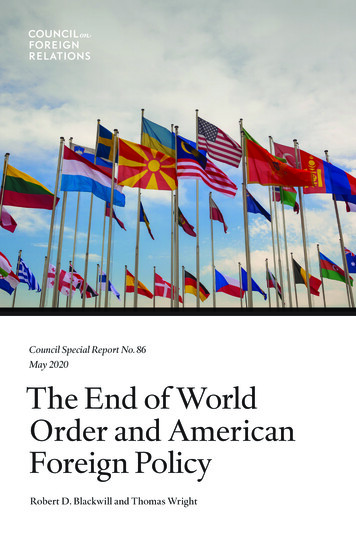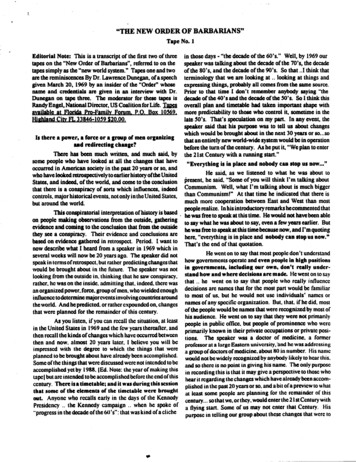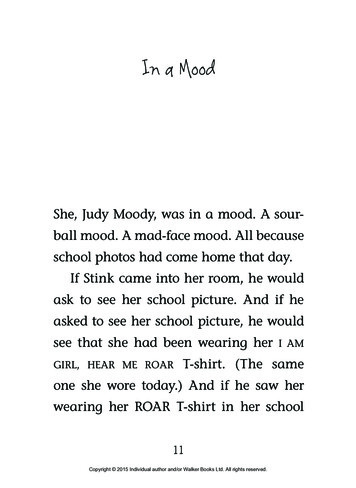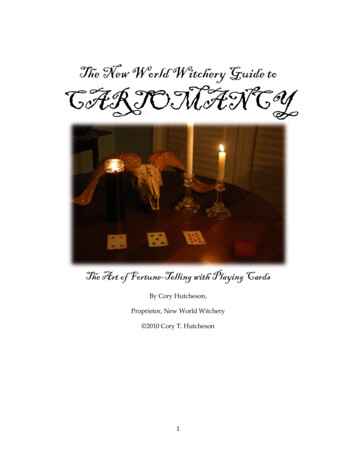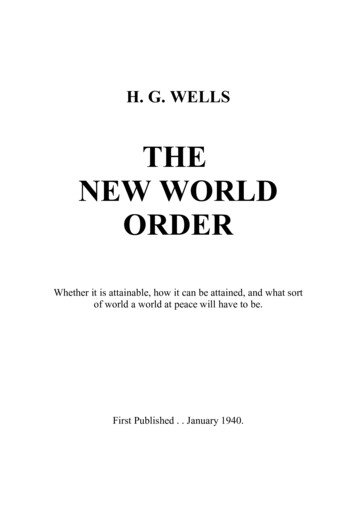
Transcription
H. G. WELLSTHENEW WORLDORDERWhether it is attainable, how it can be attained, and what sortof world a world at peace will have to be.First Published . . January 1940.
1THE END OF AN AGEIN THIS SMALL BOOK I want to set down as compactly,clearly and usefully as possible the gist of what I have learntabout war and peace in the course of my life. I am not going towrite peace propaganda here. I am going to strip down certaingeneral ideas and realities of primary importance to theirframework, and so prepare a nucleus of useful knowledge forthose who have to go on with this business of making a worldpeace. I am not going to persuade people to say "Yes, yes" for aworld peace; already we have had far too much abolition of warby making declarations and signing resolutions; everybodywants peace or pretends to want peace, and there is no need toadd even a sentence more to the vast volume of suchineffective stuff. I am simply attempting to state the things wemust do and the price we must pay for world peace if we reallyintend to achieve it.Until the Great War, the First World War, I did not bother verymuch about war and peace. Since then I have almostspecialised upon this problem. It is not very easy to recallformer states of mind out of which, day by day and year byyear, one has grown, but I think that in the decades before 1914not only I but most of my generation - in the British Empire,America, France and indeed throughout most of the civilisedworld - thought that war was dying out.So it seemed to us. It was an agreeable and therefore a readilyacceptable idea. We imagined the Franco-German War of1870-71 and the Russo-Turkish War of 1877-78 were the finalconflicts between Great Powers, that now there was a Balance
of Power sufficiently stable to make further major warfareimpracticable. A Triple Alliance faced a Dual Alliance andneither had much reason for attacking the other. We believedwar was shrinking to mere expeditionary affairs on theoutskirts of our civilisation, a sort of frontier police business.Habits of tolerant intercourse, it seemed, were beingstrengthened every year that the peace of the Powers remainedunbroken.There was in deed a mild armament race going on; mild by ourpresent standards of equipment; the armament industry was agrowing and enterprising on; but we did not see the fullimplication of that; we preferred to believe that the increasinggeneral good sense would be strong enough to prevent thesemultiplying guns from actually going off and hitting anything.And we smiled indulgently at uniforms and parades and armymanœuvres. They were the time-honoured toys and regalia ofkings and emperors. They were part of the display side of lifeand would never get to actual destruction and killing. I do notthink that exaggerates the easy complacency of, let us say,1895, forty-five years ago. It was a complacency that lastedwith most of us up to 1914. In 1914 hardly anyone in Europe orAmerica below the age of fifty had seen anything of war in hisown country.The world before 1900 seemed to be drifting steadily towards atacit but practical unification. One could travel without apassport over the larger part of Europe; the Postal Uniondelivered one’s letters uncensored and safely from Chile toChina; money, based essentially on gold, fluctuated only veryslightly; and the sprawling British Empire still maintained atradition of free trade, equal treatment and open-handedness toall comers round and about the planet. In the United States youcould go for days and never see a military uniform. Comparedwith to-day that was, upon the surface at any rate, an age of
easy-going safety and good humour. Particularly for the NorthAmericans and the Europeans.But apart from that steady, ominous growth of the armamentindustry there were other and deeper forces at work that werepreparing trouble. The Foreign Offices of the various sovereignstates had not forgotten the competitive traditions of theeighteenth century. The admirals and generals werecontemplating with something between hostility andfascination, the hunger weapons the steel industry was gentlypressing into their hands. Germany did not share the selfcomplacency of the English-speaking world; she wanted aplace in the sun; there was increasing friction about thepartition of the raw material regions of Africa; the Britishsuffered from chronic Russophobia with regard to their vastapportions in the East, and set themselves to nurse Japan into amodernised imperialist power; and also they "rememberedMajuba"; the United States were irritated by the disorder ofCuba and felt that the weak, extended Spanish possessionswould be all the better for a change of management. So thegame of Power Politics went on, but it went on upon themargins of the prevailing peace. There were several wars andchanges of boundaries, but they involved no fundamentaldisturbance of the general civilised life; they did not seem tothreaten its broadening tolerations and understandings in anyfundamental fashion. Economic stresses and social troublestirred and muttered beneath the orderly surfaces of politicallife, but threatened no convulsion. The idea of altogethereliminating war, of clearing what was left of it away, was in theair, but it was free from any sense of urgency. The HagueTribunal was established and there was a steady disseminationof the conceptions of arbitration and international law. It reallyseemed to many that the peoples of the earth were settlingdown in their various territories to a litigious rather than abelligerent order. If there was much social injustice it was
being mitigated more and more by a quickening sense of socialdecency. Acquisitiveness conducted itself with decorum andpublic-spiritedness was in fashion. Some of it was quite honestpublic-spiritedness.In those days, and they are hardly more than half a lifetimebehind us, no one thought of any sort of world administration.That patchwork of great Powers and small Powers seemed themost reasonable and practicable method of running thebusiness of mankind. Communications were far too difficult forany sort of centralised world controls. Around the World inEighty Days, when it was published seventy years ago, seemedan extravagant fantasy. It was a world without telephone orradio, with nothing swifter than a railway train or moredestructive than the earlier types of H.E. shell. They weremarvels. It was far more convenient to administer that world ofthe Balance of Power in separate national areas and, since therewere such limited facilities for peoples to get at one anotherand do each other mischiefs, there seemed no harm in ardentpatriotism and the complete independence of separatesovereign states.Economic life was largely directed by irresponsible privatebusinesses and private finance which, because of their privateownership, were able to spread out their unifying transactionsin a network that paid little attention to frontiers and national,racial or religious sentimentality. "Business" was much more ofa world commonwealth than the political organisations. Therewere many people, especially in America, who imagined that"Business" might ultimately unify the world and governmentssink into subordination to its network.Nowadays we can be wise after the event and we can see thatbelow this fair surface of things, disruptive forces were steadilygathering strength. But these disruptive forces played a
comparatively small rôle in the world spectacle of half acentury ago, when the ideas of that older generation which stilldominates our political life and the political education of itssuccessors, were formed. It is from the conflict of thoseBalance of Power and private enterprise ideas, half a centuryold, that one of the main stresses of our time arises. These ideasworked fairly well in their period and it is still with extremereluctance that our rulers, teachers, politicians, face thenecessity for a profound mental adaptation of their views,methods and interpretations to these disruptive forces that onceseemed so negligible and which are now shattering their oldorder completely.It was because of this belief in a growing good-will amongnations, because of the general satisfaction with things as theywere, that the German declarations of war in 1914 aroused sucha storm of indignation throughout the entire comfortable world.It was felt that the German Kaiser had broken the tranquillity ofthe world club, wantonly and needlessly. The war was fought"against the Hohenzollerns." They were to be expelled from theclub, certain punitive fines were to be paid and all would bewell. That was the British idea of 1914. This out-of-date warbusiness was then to be cleared up once for all by a mutualguarantee by all the more respectable members of the clubthrough a League of Nations. There was no apprehension ofany deeper operating causes in that great convulsion on the partof the worthy elder statesmen who made the peace. And soVersailles and its codicils.For twenty years the disruptive forces have gone on growingbeneath the surface of that genteel and shallow settlement, andtwenty years there has been no resolute attack upon the riddleswith which their growth confronts us. For all that period of theLeague of Nations has been the opiate of liberal thought in theworld.
To-day there is war to get rid of Adolf Hitler, who has nowtaken the part of the Hohenzollerns in the drama. He too hasoutraged the Club Rules and he too is to be expelled. The war,the Chamberlain-Hitler War, is being waged so far by theBritish Empire in quite the old spirit. It has learnt nothing andforgotten nothing. There is the same resolute disregard of anymore fundamental problem.Still the minds of our comfortable and influential ruling-classpeople refuse to accept the plain intimation that their time isover, that the Balance of Power and uncontrolled businessmethods cannot continue, and that Hitler, like theHohenzollerns, is a mere offensive pustule on the face of adeeply ailing world. To get rid of him and his Nazis will be nomore a cure for the world’s ills than scraping will heal measles.The disease will manifest itself in some new eruption. It is thesystem of nationalist individualism and unco-ordinatedenterprise that is the world’s disease, and it is the whole systemthat has to go. It has to be reconditioned down to itsfoundations or replaced. It cannot hope to "muddle through"amiably, wastefully and dangerously, a second time.World peace means all that much revolution. More and more ofus begin to realise that it cannot mean less.The first thing, therefore that has to be done in thinking out theprimary problems of world peace is to realise this, that we areliving in the end of a definite period of history, the period ofthe sovereign states. As we used to say in the eighties withever-increasing truth: "We are in an age of transition". Now weget some measure of the acuteness of the transition. It is aphase of human life which may lead, as I am trying to show,either to a new way of living for our species or else to a longeror briefer dégringolade of violence, misery, destruction, deathand the extinction of mankind. These are not rhetorical phrases
I am using here; I mean exactly what I say, the disastrousextinction of mankind.That is the issue before us. It is no small affair of parlourpolitics we have to consider. As I write, in the moment,thousands of people are being killed, wounded, hunted,tormented, ill-treated, delivered up to the most intolerable andhopeless anxiety and destroyed morally and mentally, and thereis nothing in sight at present to arrest this spreading processand prevent its reaching you and yours. It is coming for you andyours now at a great pace. Plainly in so far as we are rationalforeseeing creatures there is nothing for any of us now but tomake this world peace problem the ruling interest and directionof our lives. If we run away from it it will pursue and get us.We have to face it. We have to solve it or be destroyed by it. Itis as urgent and comprehensive as that.
2OPEN CONFERENCEBEFORE WE EXAMINE WHAT I have called so far the"disruptive forces" in the current social order, let me underlineone primary necessity for the most outspoken free discussion ofthe battling organisations and the crumbling institutions amidstwhich we lead our present uncomfortable and precarious lives.There must be no protection for leaders and organisations fromthe most searching criticism, on the plea that out country is ormay be at war. Or on any pretence. We must talk openly,widely and plainly. The war is incidental; the need forrevolutionary reconstruction is fundamental. None of us areclear as yet upon some of the most vital questions before us, weare not lucid enough in our own minds to be ambiguous, and amumbling tactfulness and indirect half-statements made withan eye upon some censor, will confuse our thoughts and thethoughts of those with whom we desire understanding, to thecomplete sterilisation and defeat of every reconstructive effort.We want to talk and tell exactly what our ideas and feelingsare, not only to our fellow citizens, but to our allies, to neutralsand, above all, to the people who are marshalled in armsagainst us. We want to get the same sincerity from them.Because until we have worked out a common basis of ideaswith them, peace will be only an uncertain equilibrium whilefresh antagonisms develop.Concurrently with this war we need a great debate. We wantevery possible person in the world to take part in that debate. Itis something much more important than the actual warfare. It is
intolerable to think of this storm of universal distress leadingup to nothing but some "conference" of diplomatists out oftouch with the world, with secret sessions, ambiguous"understandings." . . . Not twice surely can that occur. And yetwhat is going to prevent its recurring?It is quite easy to define the reasonable limits of censorship in abelligerent country. It is manifest that the publication of anyinformation likely to be of the slightest use to an enemy mustbe drastically anticipated and suppressed; not only directinformation, for example, but intimations and careless betrayalsabout the position and movements of ships, troops, camps,depots of munitions, food supplies, and false reports of defeatsand victories and coming shortages, anything that may lead toblind panic and hysteria, and so forth and so on. But the mattertakes on a different aspect altogether when it comes tostatements and suggestions that may affect public opinion inone’s own country or abroad, and which may help us towardswholesome and corrective political action.One of the more unpleasant aspects of a state of war undermodern conditions is the appearance of a swarm of individuals,too clever by half, in positions of authority. Excited, conceited,prepared to lie, distort and generally humbug people into statesof acquiescence, resistance, indignation, vindictiveness, doubtand mental confusion, states of mind supposed to beconductive to a final military victory. These people love totwist and censor facts. It gives them a feeling of power; if theycannot create they can at least prevent and conceal. Particularlythey poke themselves in between us and the people with whomwe are at war to distort any possible reconciliation. They sit,filled with the wine of their transitory powers, aloof from thefatigues and dangers of conflict, pulling imaginary strings inpeople’s minds.
In Germany popular thought is supposed to be under thecontrol of Herr Dr Goebbels; in Great Britain we writers havebeen invited to place ourselves at the disposal of some Ministryof Information, that is to say at the disposal of hitherto obscureand unrepresentative individuals, and write under its advice.Officials from the British Council and the Conservative PartyHeadquarters appear in key positions in this Ministry ofInformation. That curious and little advertised organisation Ihave just mentioned, the creation I am told of Lord Lloyd, thatBritish Council, sends emissaries abroad, writers, well-dressedwomen and other cultural personages, to lecture, charm andwin over foreign appreciation for British characteristics, forBritish scenery, British political virtues and so forth. Somehowthis is supposed to help something or other. Quietly,unobtrusively, this has gone on. Maybe these sample Britishgive unauthorised assurances but probably they do littlepositive harm. But they ought not to be employed at all. Anygovernment propaganda is contrary to the essential spirit ofdemocracy. The expression of opinion and collective thoughtshould be outside the range of government activities altogether.It should be the work of free individuals whose prominence isdependent upon the response and support of the general mind.But here I have to make amends to Lord Lloyd. I was led tobelieve that the British Council was responsible for Mr.Teeling, the author of Crisis for Christianity, and I said as muchin The Fate of Homo Sapiens. I now unsay it. Mr. Teeling, Igather, was sent out upon his journeys by a Catholicnewspaper. The British Council was entirely innocent of him.It is not only that the Ministries of Information and Propagandado their level best to divert the limited gifts and energies ofsuch writers, lecturers and talkers as we possess, to theproduction of disingenuous muck that will muddle the public
mind and mislead the enquiring foreigner, but that they show amarked disposition to stifle any free and independent utterancesthat my seem to traverse their own profound and secret plansfor the salvation of mankind.Everywhere now it is difficult to get adequate, far-reachingpublicity for outspoken discussion of the way the world isgoing, and the political, economic and social forces that carryus along. This is not so much due to deliberate suppression asto the general disorder into which human affairs are dissolving.There is indeed in the Atlantic world hardly a sign as yet of thatdirect espionage upon opinion that obliterates the mental life ofthe intelligent Italian or German or Russian to-day almostcompletely; one may still think what one likes, say what onelikes and write what one likes, but nevertheless there is alreadyan increasing difficulty in getting bold, unorthodox views heardand read. Newspapers are afraid upon all sorts of minor counts,publishers, with such valiant exceptions as the publishers ofthis matter, are morbidly discreet; they get Notice D to avoidthis or that particular topic; there are obscure boycotts and tradedifficulties hindering the wide diffusion of general ideas incountless ways. I do not mean there is any sort of organisedconspiracy to suppress discussion, but I do say that the Press,the publishing and bookselling organisations in our freecountries, provide a very ill-organised and inadequatemachinery for the ventilation and distribution of thought.Publishers publish for nothing but safe profits; it wouldastound a bookseller to tell him he was part of the world’seducational organisation or a publisher’s traveller, that heexisted for any other purpose than to book maximum orders forbest sellers and earn a record commission - letting the otherstuff, the highbrow stuff and all that, go hang. They do notunderstand that they ought to put public service before gain.They have no inducement to do so and no pride in their
function. Theirs is the morale of a profiteering world.Newspapers like to insert brave-looking articles ofconventional liberalism, speaking highly of peace anddisplaying a noble vagueness about its attainment; now we areat war they will publish the fiercest attacks upon the enemy because such attacks are supposed to keep up the fighting spiritof the country; but any ideas that are really loudly and clearlyrevolutionary they dare not circulate at all. Under these bafflingconditions there is no thorough discussion of the world outlookwhatever, anywhere. The democracies are only a shade betterthan the dictatorships in this respect. It is ridiculous torepresent them as realms of light at issue with darkness.This great debate upon the reconstruction of the world is athing more important and urgent than the war, and there existno adequate media for the utterance and criticism andcorrection of any broad general convictions. There is a certainfruitless and unproductive spluttering of constructive ideas, butthere is little sense of sustained enquiry, few real interchanges,inadequate progress, nothing is settled, nothing is dismissed asunsound and nothing is won permanently. No one seems tohear what anyone else is saying. That is because there is nosense of an audience for these ideologists. There is no effectiveaudience saying rudely and obstinately: "What A. has said,seems important. Will B. and C., instead of bombinating in thevoid, tell us exactly where and why they differ from A.? Andnow we have got to the common truth of A., B., C., and D.Here is F. saying something. Will he be so good as to correlatewhat he has to say with A., B., C., and D.?"But there is no such background of an intelligently observantand critical world audience in evidence. There are a few peoplehere and there reading and thinking in disconnected fragments.This is all the thinking our world is doing in the face ofplanetary disaster. The universities, bless them! are in uniform
or silent.We need to air our own minds; we need frank exchanges, if weare to achieve any common understanding. We need to workout a clear conception of the world order we would prefer tothis present chaos, we need to dissolve or compromise uponour differences so that we may set our faces with assurancetowards an attainable world peace. The air is full of thepanaceas of half-wits, none listening to the others and most ofthem trying to silence the others in their impatience. Thousandsof fools are ready to write us a complete prescription for ourworld troubles. Will people never realise their own ignoranceand incompleteness, from which arise this absolute necessityfor the plainest statement of the realities of the problem, for themost exhaustive and unsparing examination of differences ofopinion, and for the most ruthless canvassing of everypossibility, however unpalatable it may seem at first, of thesituation?Before anything else, therefore, in this survey of the way toworld peace, I put free speech and vigorous publication. It isthe thing best worth fighting for. It is the essence of yourpersonal honour. It is your duty as a world citizen to do whatyou can for that. You have not only to resist suppressions, youhave to fight your way out of the fog. If you find yourbookseller or newsagent failing to distribute any type ofpublication whatever - even if you are in entire disagreementwith the views of that publication - you should turn the weaponof the boycott upon the offender and find another bookseller ornewsagent for everything you read. The would-be world citizenshould subscribe also to such organisation as the NationalCouncil for Civil Liberties; he should use any advantage hisposition may give him to check suppression of free speech; andhe should accustom himself to challenge nonsense politely butfirmly and say fearlessly and as clearly as possible what is in
his mind and to listen as fearlessly to whatever is said to him.So that he may know better either through reassurance orcorrection. To get together with other people to argue anddiscuss, to think and organise and then implement thought isthe first duty of every reasonable man.This world of ours is going to pieces. It has to be reconstructedand it can only be effectively reconstructed in the light. Onlythe free, clear, open mind can save us, and these difficulties andobstructions on our line of thought are as evil as childrenputting obstacles on a railway line or scattering nails on anautomobile speed track.This great world debate must go on, and it must go on now.Now while the guns are still thudding, is the time for thought. Itis incredibly foolish to talk as so many people do of ending thewar and then having a World Conference to inaugurate a newage. So soon as the fighting stops the real world conference, thelive discussion, will stop, too. The diplomats and politicianswill assemble with an air of profound competence and close thedoors upon the outer world and resume - Versailles. While thesilenced world gapes and waits upon their mysteries.
3DISRUPTIVE FORCESAND NOW LET US come to the disruptive forces that havereduced that late-nineteenth-century dream of a powerful worldpatchwork of more and more civilised states linked by an everincreasing financial and economic interdependence, tocomplete incredibility, and so forced upon every intelligentmind the need to work out a new conception of the World thatought to be. It is supremely important that the nature of thesedisruptive forces should be clearly understood and kept inmind. To grasp them is to hold the clues to the world’s presenttroubles. To forget about them, even for a moment, is to losetouch with essential reality and drift away into minor issues.The first group of these forces is what people are accustomedto speak of as "the abolition of distance" and "the change ofscale" in human operations. This "abolition of distance" beganrather more than a century ago, and its earlier effects were notdisruptive at all. It knit together the spreading United States ofAmerica over distances that might otherwise have strained theirsolidarity to the breaking-point, and it enabled the sprawlingBritish Empire to sustain contacts round the whole planet.The disruptive influence of the abolition of distance appearedonly later. Let us be clear upon its essential significance. Forwhat seemed like endless centuries the swiftest means oflocomotion had been the horse on the high-road, the runningman, the galley and the uncertain, weather-ruled sailing ship.(There was the Dutchman on skates on skates on his canals, butthat was an exceptional culmination of speed and not forgeneral application.) The political, social and imaginative life
of man for all those centuries was adapted to these limitingconditions. They determined the distances to which marketablegoods could conveniently be sent, the limits to which the rulercould send his orders and his solders, the bounds set to gettingnews, and indeed the whole scale of living. There could be verylittle real community feeling beyond the range of frequentintercourse.Human life fell naturally therefore into areas determined by theinterplay between these limitations and such natural obstaclesas seas and mountains. Such countries as France, England,Egypt, Japan, appeared and reappeared in history like natural,necessary things, and though there were such larger politicalefforts as the Roman Empire, they never attained an enduringunity. The Roman Empire held together like wet blottingpaper; it was always falling to pieces. The older Empires,beyond their national nuclei, were mere precarious tributelevying powers. What I have already called the worldpatchwork of the great and little Powers, was therefore, underthe old horse-and-foot and sailing-ship conditions, almost asmuch a matter of natural necessity as the sizes of trees andanimals.Within a century all this has been changed and we have still toface up to what that change means for us.First came steam, the steam-railway, the steamship, and then ina quickening crescendo came the internal combustion engine,electrical traction, the motor car, the motor boat, the aeroplane,the transmission of power from central power stations, thetelephone, the radio. I feel apologetic in reciting this wellknown story. I do so in order to enforce the statement that allthe areas that were the most convenient and efficient for theold, time-honoured way of living, became more and moreinconveniently close and narrow for the new needs. This
applied to every sort of administrative area, from municipalitiesand urban districts and the range of distributing businesses, upto sovereign states. They were - and for the most part they stillare - too small for the new requirements and far too closetogether. All over the social layout this tightening-up andsqueezing together is an inconvenience, but when it comes tothe areas of sovereign states it becomes impossibly dangerous.It becomes an intolerable thing; human life cannot go on, withthe capitals of most of the civilised countries of the worldwithin an hour’s bombing range of their frontiers, behind whichattacks can be prepared and secret preparations made withoutany form of control. And yet we are still tolerant and loyal toarrangements that seek to maintain this state of affairs and treatit as though nothing else were possible.The present war for and against Hitler and Stalin and Mr.Chamberlain and so forth, does not even touch upon theessential problem of the abolition of distance. It may indeeddestroy everything and still settle nothing. If one could wipeout all the issues of the present conflict, we should still beconfronted with the essential riddle, which is the abolition ofthe boundaries of most existing sovereign states and theirmerger in some larger Pax. We have to do that if anysupportable human life is to go on. Treaties and mutualguarantees are not enough. We have surely learnt enough aboutthe value of treaties during the last half-century to realise that.We have, because of the abolition of distance alone, to gatherhuman affairs together under one common war-preventingcontrol.But this abolition of distance is only one most vivid aspect ofthe change in the conditions of human life. Interwoven withthat is a general change of scale in human operations. The pasthundred years has been an age of invention and discoverybeyond the achievements of the preceding three millennia. In abook I published eight years ago, The Work, Wealth and
Happiness of Mankind, I tried to summarise the conquest ofpower and substances
NEW WORLD ORDER Whether it is attainable, how it can be attained, and what sort of world a world at peace will have to be. First Published . . January 1940. 1 THE END OF AN AGEFile Size: 530KB
